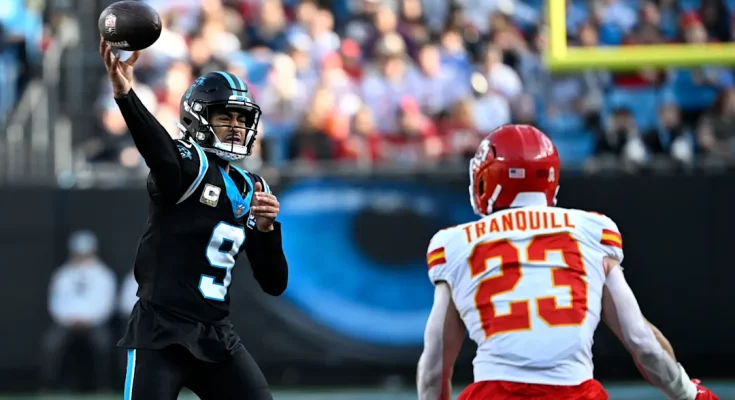In an offseason that has already seen its fair share of quarterback-related drama, one of the most unexpected headlines came from Charlotte, where a high-ranking Carolina Panthers executive publicly compared second-year quarterback Bryce Young to none other than Kansas City Chiefs superstar Patrick Mahomes. The comments, initially intended to boost internal morale and instill confidence in the Panthers’ direction, have instead sparked widespread debate across the league, inviting both criticism and curiosity about the lofty expectations now being placed on the 2023 No. 1 overall pick.
Bryce Young’s rookie campaign was far from spectacular. He struggled behind a patchwork offensive line, lacked consistent weapons on the outside, and was part of a team that spiraled into dysfunction by midseason. The Panthers ended the 2023 season with a 2-15 record, the worst in the NFL, and subsequently fired head coach Frank Reich before December was even over. To most outside observers, the situation was a textbook case of a talented young quarterback being thrown into the fire with minimal support. Still, there were glimpses — brief but promising — that Young’s poise, intelligence, and creativity could eventually lead him to fulfill the massive expectations that came with being the first player selected in his draft class.
Enter Dan Morgan, the newly promoted general manager of the Panthers, who has been unrelenting in his public support of Young. Speaking at a recent team event for corporate sponsors and season ticket holders, Morgan offered a bold proclamation: “Bryce reminds me of a young Mahomes. Not just in the way he throws, but in how he sees the field, processes the game, and leads quietly but confidently. We believe we’ve got something really special here.” The comment drew audible gasps from the audience and quickly went viral online. Social media was immediately flooded with reactions, ranging from hopeful optimism among Panthers fans to outright mockery from skeptics around the NFL landscape.
Comparisons to Mahomes are dangerous, not because they’re impossible, but because Mahomes has become a generational measuring stick — a once-in-a-lifetime type of quarterback who is redefining how the position is played. Since taking over as the Chiefs’ starter in 2018, Mahomes has led his team to four Super Bowl appearances, winning three, while accumulating multiple MVP awards and shattering records. Suggesting that any young quarterback could follow in those footsteps is essentially staking your job and reputation on it. That’s exactly what Morgan has done, and whether it’s brilliance or desperation remains to be seen.
Internally, the Panthers’ brass has not been shy about their intent to build around Young for the long haul. After taking over football operations, Morgan made it a point to revamp the offensive staff, hiring Dave Canales as the new head coach. Canales, fresh off an impressive season as the offensive coordinator for the Tampa Bay Buccaneers, where he helped resurrect Baker Mayfield’s career, is widely viewed as a quarterback-friendly coach who emphasizes timing, confidence, and rhythm. He has already spent considerable time with Young in offseason workouts, installing a simplified but aggressive offense that plays to the quarterback’s strengths.
Canales himself echoed Morgan’s sentiment, albeit in a more measured tone. “When you look at Bryce on tape and you really study the details — his footwork, his anticipation, how he navigates pressure — it’s elite-level stuff. The results didn’t always show up last year, but the foundation is there. I’ve worked with a lot of quarterbacks, and this kid has what you can’t teach.”
The Panthers have also been active in reshaping the roster to make life easier for their young signal caller. In free agency, they signed veteran wide receiver Diontae Johnson, who brings precise route running and a knack for finding soft spots in coverage. They used a second-round pick on explosive Texas receiver Xavier Worthy before ultimately flipping him in a three-team trade that netted them additional draft capital and offensive line help. Carolina also added two new starting-caliber guards in free agency and invested in a veteran center to stabilize the interior protection that so often failed Young during his rookie season.
All these moves are part of a broader organizational strategy — one that seems to suggest the Panthers believe their success hinges not just on whether Bryce Young can improve, but whether he can become a superstar. The Mahomes comparison, though jarring, fits into that narrative. Morgan’s comments weren’t simply hyperbole to excite the fanbase; they were reflective of the franchise’s internal belief that Young could be a franchise-altering player, and that his development will be the primary determinant of whether this current regime survives.
Behind the scenes, there are signs that the Panthers are already beginning to prepare for the long-term extension that would come if Young develops into the type of player they believe he can be. Rookie contracts for first overall picks are structured with a fifth-year team option, but the real financial commitment usually comes at the end of year three, when front offices typically decide whether to offer a blockbuster extension or delay the process. Mahomes himself signed his record-setting 10-year, \$450 million extension in the summer following his third season — which just so happened to be his second MVP campaign and a Super Bowl win.
While Young isn’t remotely in that stratosphere yet, early chatter suggests Carolina wants to keep all options on the table. One source close to the team said, “If Bryce takes the leap this year — and we think he will — don’t be surprised if they start talking extension next summer. They want to be proactive, not reactive.”
But therein lies the pressure. If Young struggles again, especially in a year where the Panthers have added weapons and upgraded coaching, the Mahomes comparison could haunt this front office for years. Critics already point to Young’s size — at 5’10” and just barely over 190 pounds, he’s one of the smallest quarterbacks in modern NFL history — as a built-in durability concern. Though he avoided major injury in his rookie season, he took plenty of punishment behind Carolina’s leaky offensive line, and long-term questions remain about whether he can physically endure the weekly grind of NFL football.
Moreover, his rookie tape, while not without bright spots, often showed a quarterback who held onto the ball too long, hesitated on open reads, and sometimes tried to do too much when a simpler play would have sufficed. These are typical growing pains, especially for rookies thrust into difficult environments, but they are not insignificant. If Young doesn’t show meaningful growth in year two, especially with an improved supporting cast and a more competent coaching staff, the Mahomes talk will not age well.
It also invites unfair expectations. Mahomes had the benefit of sitting his rookie year behind Alex Smith, learning from one of the NFL’s most stable coaching environments under Andy Reid, and then taking over a team loaded with weapons like Tyreek Hill and Travis Kelce. Young had none of those luxuries. He was thrown into a chaotic situation on a rebuilding team with little identity. For any executive to expect Mahomes-like results from a quarterback in that situation, even over time, is bordering on fantasy unless they are truly seeing something the rest of the football world has not.
That said, Young’s work ethic and intelligence have never been in question. Coaches and teammates alike rave about his attention to detail, film study habits, and quiet but effective leadership style. Veteran players have described him as “wise beyond his years” and “someone who owns the room without needing to be loud.” Those intangible qualities, while not easily quantifiable, are often what separate merely good quarterbacks from the great ones. If Young has those traits in abundance, then the physical tools — however modest by NFL standards — might be enough to make the Mahomes comparison less absurd than it initially sounds.
Still, the comment has added fuel to an already pivotal season. The NFC South is wide open, with no dominant team clearly in control. The Saints are aging and inconsistent, the Falcons have hitched their wagon to an unproven Desmond Ridder–Michael Penix Jr. tandem, and the Buccaneers are banking on another year of Baker Mayfield magic. If Young can lift the Panthers to respectability — maybe even flirt with a playoff spot — it would completely shift the narrative around him and validate the confidence Morgan and Canales have displayed. But if not, the team may soon find itself back at square one, searching for answers in a league that rarely offers second chances to general managers who bet big and miss on quarterbacks.
For now, Bryce Young seems unfazed by the noise. He’s said all the right things during offseason availability, deflecting praise and focusing on preparation. When asked about the Mahomes comparison, he smiled slightly and said, “I appreciate the support, but I’m just focused on being the best version of myself. Patrick Mahomes is a great player, but I’m Bryce Young. That’s who I’m trying to be.”
Whether Bryce Young ever reaches the heights of a Mahomes-level career is a question that will only be answered over time. But one thing is certain: the Panthers have made their bet, and they’re all in.



